Interpersonal Role: Self-Reflection on Mintzberg’s Managerial Roles
VerifiedAdded on 2023/06/10
|32
|6888
|138
Report
AI Summary
This report provides a self-reflection on Mintzberg's managerial roles, focusing on the interpersonal role, which includes leadership, liaison, and figurehead functions. It begins with a literature review of Mintzberg's model and its precursors, highlighting the importance of the interpersonal role in management. The self-analysis section reflects on a challenging group assignment and how the author leveraged Mintzberg's roles to achieve success. The report also identifies personal strengths and weaknesses in managerial skills based on diagnostic tests, culminating in an action/development plan to address weaknesses in coaching, team development, and leading change, with specific actions, resources, and measures of success. The report uses a combination of personal experiences and scholarly research to critically analyze management practices.
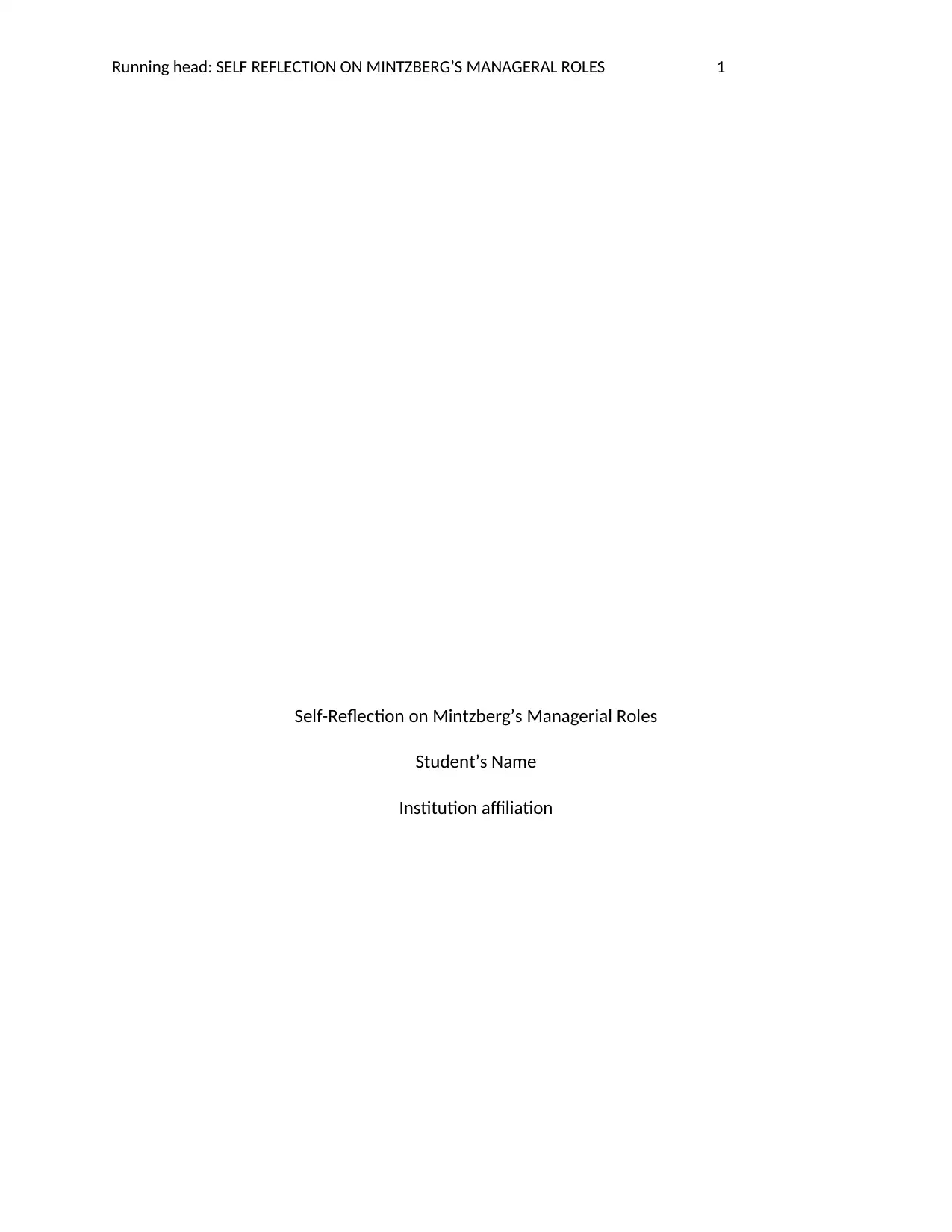
Running head: SELF REFLECTION ON MINTZBERG’S MANAGERAL ROLES 1
Self-Reflection on Mintzberg’s Managerial Roles
Student’s Name
Institution affiliation
Self-Reflection on Mintzberg’s Managerial Roles
Student’s Name
Institution affiliation
Paraphrase This Document
Need a fresh take? Get an instant paraphrase of this document with our AI Paraphraser
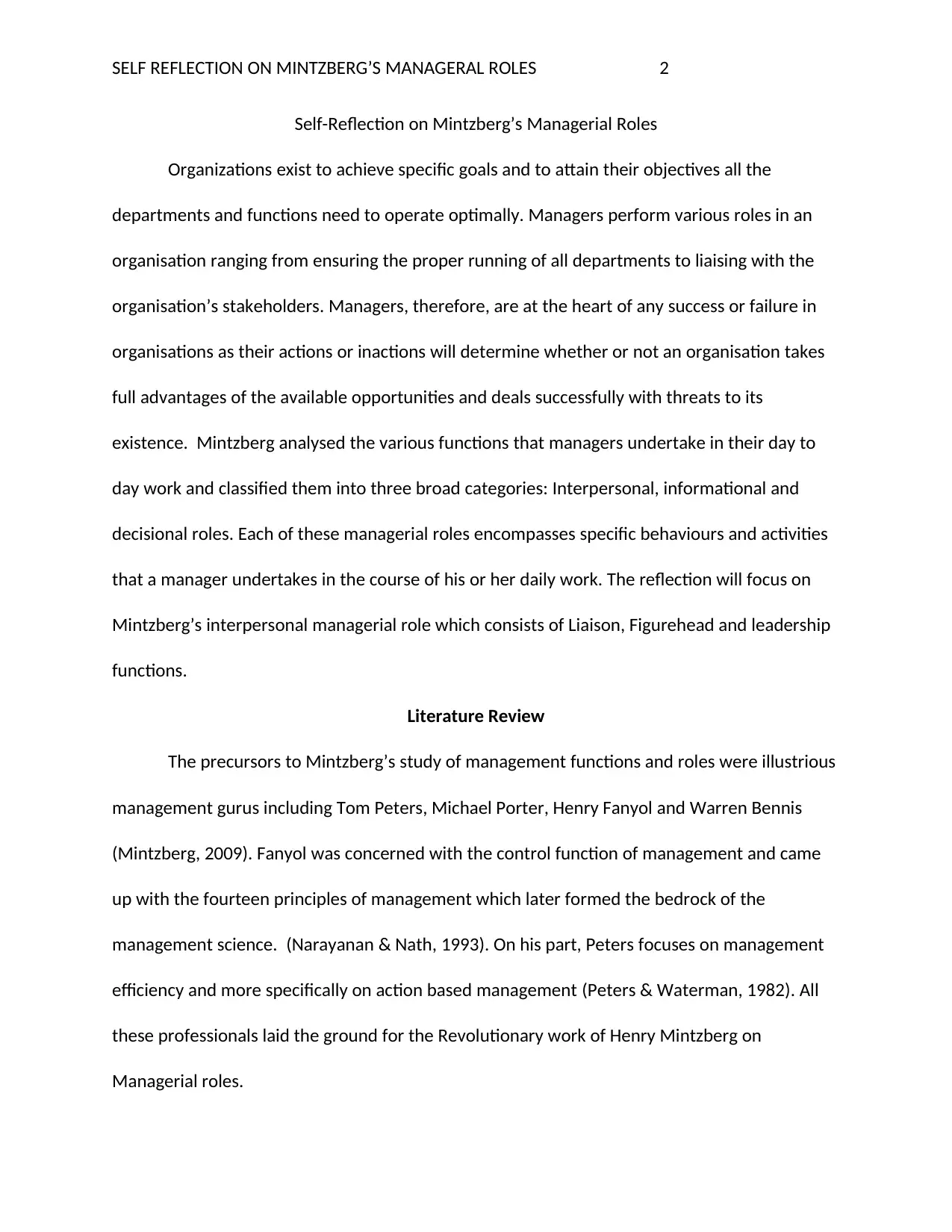
SELF REFLECTION ON MINTZBERG’S MANAGERAL ROLES 2
Self-Reflection on Mintzberg’s Managerial Roles
Organizations exist to achieve specific goals and to attain their objectives all the
departments and functions need to operate optimally. Managers perform various roles in an
organisation ranging from ensuring the proper running of all departments to liaising with the
organisation’s stakeholders. Managers, therefore, are at the heart of any success or failure in
organisations as their actions or inactions will determine whether or not an organisation takes
full advantages of the available opportunities and deals successfully with threats to its
existence. Mintzberg analysed the various functions that managers undertake in their day to
day work and classified them into three broad categories: Interpersonal, informational and
decisional roles. Each of these managerial roles encompasses specific behaviours and activities
that a manager undertakes in the course of his or her daily work. The reflection will focus on
Mintzberg’s interpersonal managerial role which consists of Liaison, Figurehead and leadership
functions.
Literature Review
The precursors to Mintzberg’s study of management functions and roles were illustrious
management gurus including Tom Peters, Michael Porter, Henry Fanyol and Warren Bennis
(Mintzberg, 2009). Fanyol was concerned with the control function of management and came
up with the fourteen principles of management which later formed the bedrock of the
management science. (Narayanan & Nath, 1993). On his part, Peters focuses on management
efficiency and more specifically on action based management (Peters & Waterman, 1982). All
these professionals laid the ground for the Revolutionary work of Henry Mintzberg on
Managerial roles.
Self-Reflection on Mintzberg’s Managerial Roles
Organizations exist to achieve specific goals and to attain their objectives all the
departments and functions need to operate optimally. Managers perform various roles in an
organisation ranging from ensuring the proper running of all departments to liaising with the
organisation’s stakeholders. Managers, therefore, are at the heart of any success or failure in
organisations as their actions or inactions will determine whether or not an organisation takes
full advantages of the available opportunities and deals successfully with threats to its
existence. Mintzberg analysed the various functions that managers undertake in their day to
day work and classified them into three broad categories: Interpersonal, informational and
decisional roles. Each of these managerial roles encompasses specific behaviours and activities
that a manager undertakes in the course of his or her daily work. The reflection will focus on
Mintzberg’s interpersonal managerial role which consists of Liaison, Figurehead and leadership
functions.
Literature Review
The precursors to Mintzberg’s study of management functions and roles were illustrious
management gurus including Tom Peters, Michael Porter, Henry Fanyol and Warren Bennis
(Mintzberg, 2009). Fanyol was concerned with the control function of management and came
up with the fourteen principles of management which later formed the bedrock of the
management science. (Narayanan & Nath, 1993). On his part, Peters focuses on management
efficiency and more specifically on action based management (Peters & Waterman, 1982). All
these professionals laid the ground for the Revolutionary work of Henry Mintzberg on
Managerial roles.
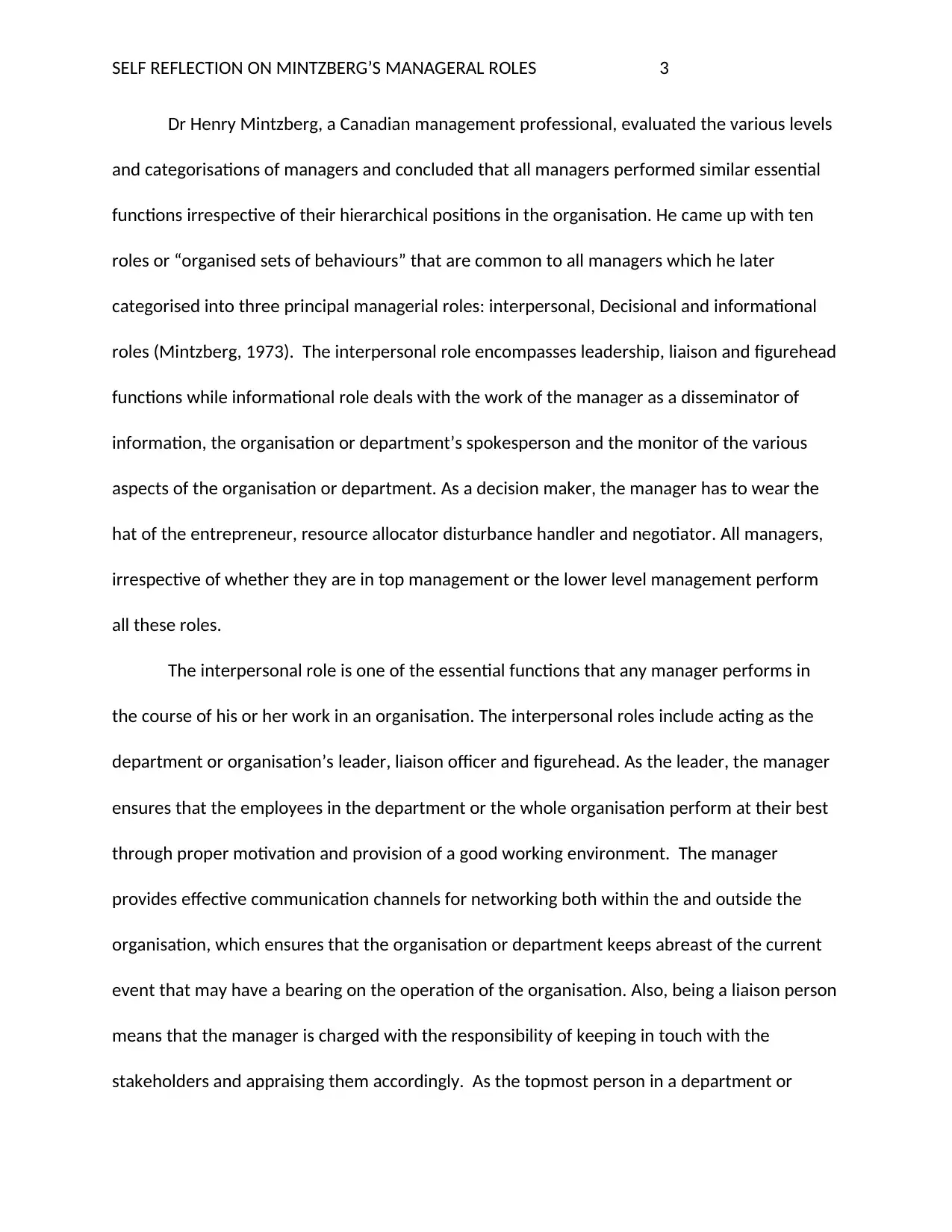
SELF REFLECTION ON MINTZBERG’S MANAGERAL ROLES 3
Dr Henry Mintzberg, a Canadian management professional, evaluated the various levels
and categorisations of managers and concluded that all managers performed similar essential
functions irrespective of their hierarchical positions in the organisation. He came up with ten
roles or “organised sets of behaviours” that are common to all managers which he later
categorised into three principal managerial roles: interpersonal, Decisional and informational
roles (Mintzberg, 1973). The interpersonal role encompasses leadership, liaison and figurehead
functions while informational role deals with the work of the manager as a disseminator of
information, the organisation or department’s spokesperson and the monitor of the various
aspects of the organisation or department. As a decision maker, the manager has to wear the
hat of the entrepreneur, resource allocator disturbance handler and negotiator. All managers,
irrespective of whether they are in top management or the lower level management perform
all these roles.
The interpersonal role is one of the essential functions that any manager performs in
the course of his or her work in an organisation. The interpersonal roles include acting as the
department or organisation’s leader, liaison officer and figurehead. As the leader, the manager
ensures that the employees in the department or the whole organisation perform at their best
through proper motivation and provision of a good working environment. The manager
provides effective communication channels for networking both within the and outside the
organisation, which ensures that the organisation or department keeps abreast of the current
event that may have a bearing on the operation of the organisation. Also, being a liaison person
means that the manager is charged with the responsibility of keeping in touch with the
stakeholders and appraising them accordingly. As the topmost person in a department or
Dr Henry Mintzberg, a Canadian management professional, evaluated the various levels
and categorisations of managers and concluded that all managers performed similar essential
functions irrespective of their hierarchical positions in the organisation. He came up with ten
roles or “organised sets of behaviours” that are common to all managers which he later
categorised into three principal managerial roles: interpersonal, Decisional and informational
roles (Mintzberg, 1973). The interpersonal role encompasses leadership, liaison and figurehead
functions while informational role deals with the work of the manager as a disseminator of
information, the organisation or department’s spokesperson and the monitor of the various
aspects of the organisation or department. As a decision maker, the manager has to wear the
hat of the entrepreneur, resource allocator disturbance handler and negotiator. All managers,
irrespective of whether they are in top management or the lower level management perform
all these roles.
The interpersonal role is one of the essential functions that any manager performs in
the course of his or her work in an organisation. The interpersonal roles include acting as the
department or organisation’s leader, liaison officer and figurehead. As the leader, the manager
ensures that the employees in the department or the whole organisation perform at their best
through proper motivation and provision of a good working environment. The manager
provides effective communication channels for networking both within the and outside the
organisation, which ensures that the organisation or department keeps abreast of the current
event that may have a bearing on the operation of the organisation. Also, being a liaison person
means that the manager is charged with the responsibility of keeping in touch with the
stakeholders and appraising them accordingly. As the topmost person in a department or
⊘ This is a preview!⊘
Do you want full access?
Subscribe today to unlock all pages.

Trusted by 1+ million students worldwide
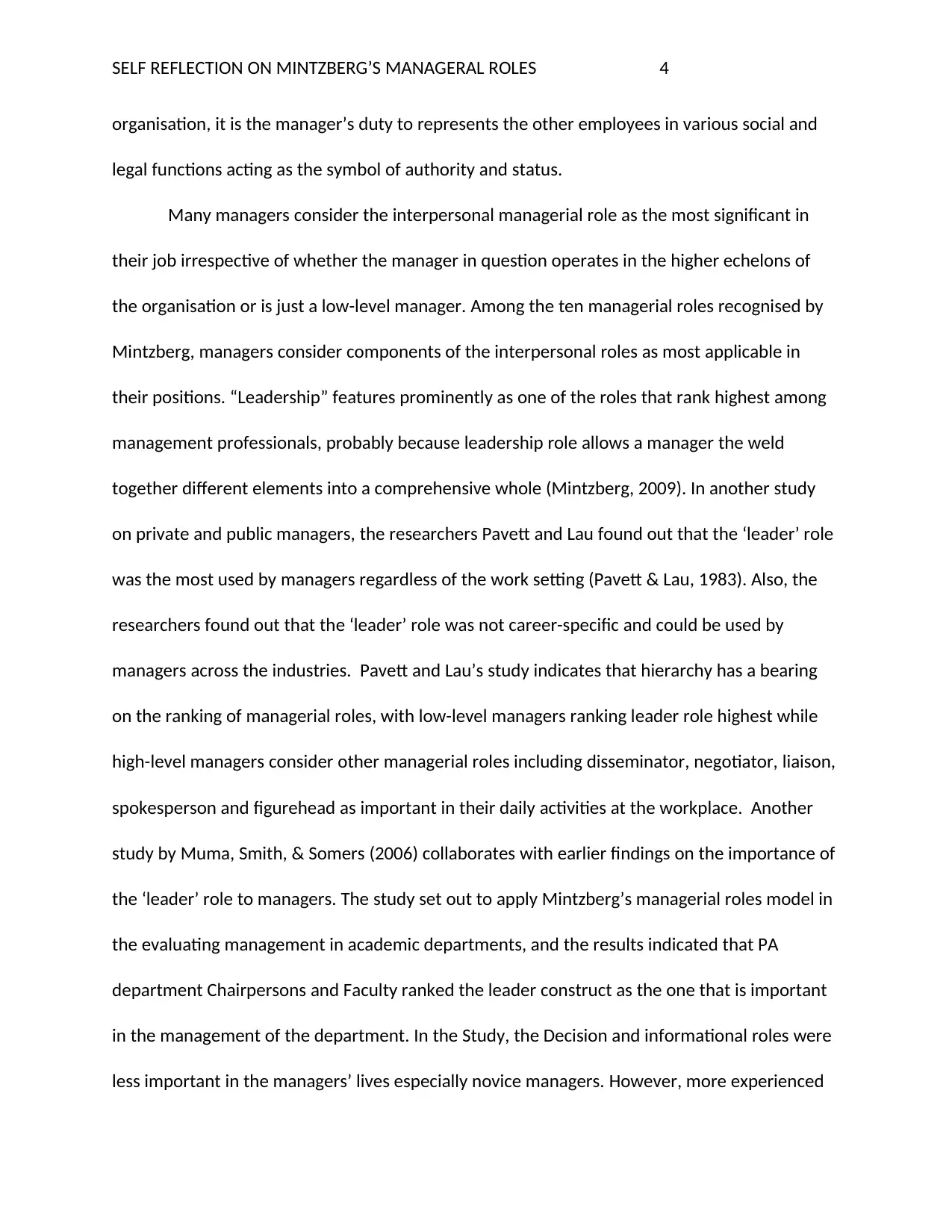
SELF REFLECTION ON MINTZBERG’S MANAGERAL ROLES 4
organisation, it is the manager’s duty to represents the other employees in various social and
legal functions acting as the symbol of authority and status.
Many managers consider the interpersonal managerial role as the most significant in
their job irrespective of whether the manager in question operates in the higher echelons of
the organisation or is just a low-level manager. Among the ten managerial roles recognised by
Mintzberg, managers consider components of the interpersonal roles as most applicable in
their positions. “Leadership” features prominently as one of the roles that rank highest among
management professionals, probably because leadership role allows a manager the weld
together different elements into a comprehensive whole (Mintzberg, 2009). In another study
on private and public managers, the researchers Pavett and Lau found out that the ‘leader’ role
was the most used by managers regardless of the work setting (Pavett & Lau, 1983). Also, the
researchers found out that the ‘leader’ role was not career-specific and could be used by
managers across the industries. Pavett and Lau’s study indicates that hierarchy has a bearing
on the ranking of managerial roles, with low-level managers ranking leader role highest while
high-level managers consider other managerial roles including disseminator, negotiator, liaison,
spokesperson and figurehead as important in their daily activities at the workplace. Another
study by Muma, Smith, & Somers (2006) collaborates with earlier findings on the importance of
the ‘leader’ role to managers. The study set out to apply Mintzberg’s managerial roles model in
the evaluating management in academic departments, and the results indicated that PA
department Chairpersons and Faculty ranked the leader construct as the one that is important
in the management of the department. In the Study, the Decision and informational roles were
less important in the managers’ lives especially novice managers. However, more experienced
organisation, it is the manager’s duty to represents the other employees in various social and
legal functions acting as the symbol of authority and status.
Many managers consider the interpersonal managerial role as the most significant in
their job irrespective of whether the manager in question operates in the higher echelons of
the organisation or is just a low-level manager. Among the ten managerial roles recognised by
Mintzberg, managers consider components of the interpersonal roles as most applicable in
their positions. “Leadership” features prominently as one of the roles that rank highest among
management professionals, probably because leadership role allows a manager the weld
together different elements into a comprehensive whole (Mintzberg, 2009). In another study
on private and public managers, the researchers Pavett and Lau found out that the ‘leader’ role
was the most used by managers regardless of the work setting (Pavett & Lau, 1983). Also, the
researchers found out that the ‘leader’ role was not career-specific and could be used by
managers across the industries. Pavett and Lau’s study indicates that hierarchy has a bearing
on the ranking of managerial roles, with low-level managers ranking leader role highest while
high-level managers consider other managerial roles including disseminator, negotiator, liaison,
spokesperson and figurehead as important in their daily activities at the workplace. Another
study by Muma, Smith, & Somers (2006) collaborates with earlier findings on the importance of
the ‘leader’ role to managers. The study set out to apply Mintzberg’s managerial roles model in
the evaluating management in academic departments, and the results indicated that PA
department Chairpersons and Faculty ranked the leader construct as the one that is important
in the management of the department. In the Study, the Decision and informational roles were
less important in the managers’ lives especially novice managers. However, more experienced
Paraphrase This Document
Need a fresh take? Get an instant paraphrase of this document with our AI Paraphraser
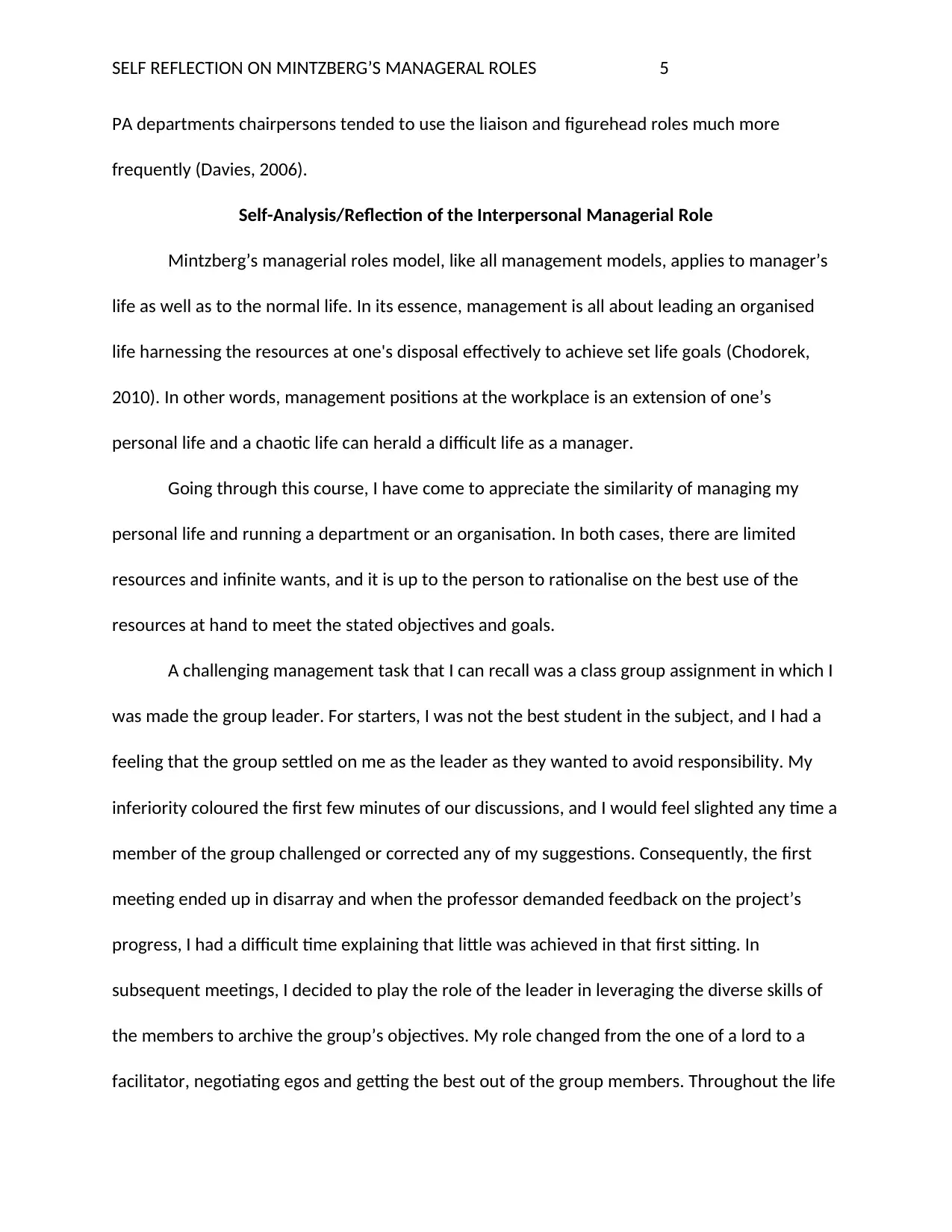
SELF REFLECTION ON MINTZBERG’S MANAGERAL ROLES 5
PA departments chairpersons tended to use the liaison and figurehead roles much more
frequently (Davies, 2006).
Self-Analysis/Reflection of the Interpersonal Managerial Role
Mintzberg’s managerial roles model, like all management models, applies to manager’s
life as well as to the normal life. In its essence, management is all about leading an organised
life harnessing the resources at one's disposal effectively to achieve set life goals (Chodorek,
2010). In other words, management positions at the workplace is an extension of one’s
personal life and a chaotic life can herald a difficult life as a manager.
Going through this course, I have come to appreciate the similarity of managing my
personal life and running a department or an organisation. In both cases, there are limited
resources and infinite wants, and it is up to the person to rationalise on the best use of the
resources at hand to meet the stated objectives and goals.
A challenging management task that I can recall was a class group assignment in which I
was made the group leader. For starters, I was not the best student in the subject, and I had a
feeling that the group settled on me as the leader as they wanted to avoid responsibility. My
inferiority coloured the first few minutes of our discussions, and I would feel slighted any time a
member of the group challenged or corrected any of my suggestions. Consequently, the first
meeting ended up in disarray and when the professor demanded feedback on the project’s
progress, I had a difficult time explaining that little was achieved in that first sitting. In
subsequent meetings, I decided to play the role of the leader in leveraging the diverse skills of
the members to archive the group’s objectives. My role changed from the one of a lord to a
facilitator, negotiating egos and getting the best out of the group members. Throughout the life
PA departments chairpersons tended to use the liaison and figurehead roles much more
frequently (Davies, 2006).
Self-Analysis/Reflection of the Interpersonal Managerial Role
Mintzberg’s managerial roles model, like all management models, applies to manager’s
life as well as to the normal life. In its essence, management is all about leading an organised
life harnessing the resources at one's disposal effectively to achieve set life goals (Chodorek,
2010). In other words, management positions at the workplace is an extension of one’s
personal life and a chaotic life can herald a difficult life as a manager.
Going through this course, I have come to appreciate the similarity of managing my
personal life and running a department or an organisation. In both cases, there are limited
resources and infinite wants, and it is up to the person to rationalise on the best use of the
resources at hand to meet the stated objectives and goals.
A challenging management task that I can recall was a class group assignment in which I
was made the group leader. For starters, I was not the best student in the subject, and I had a
feeling that the group settled on me as the leader as they wanted to avoid responsibility. My
inferiority coloured the first few minutes of our discussions, and I would feel slighted any time a
member of the group challenged or corrected any of my suggestions. Consequently, the first
meeting ended up in disarray and when the professor demanded feedback on the project’s
progress, I had a difficult time explaining that little was achieved in that first sitting. In
subsequent meetings, I decided to play the role of the leader in leveraging the diverse skills of
the members to archive the group’s objectives. My role changed from the one of a lord to a
facilitator, negotiating egos and getting the best out of the group members. Throughout the life
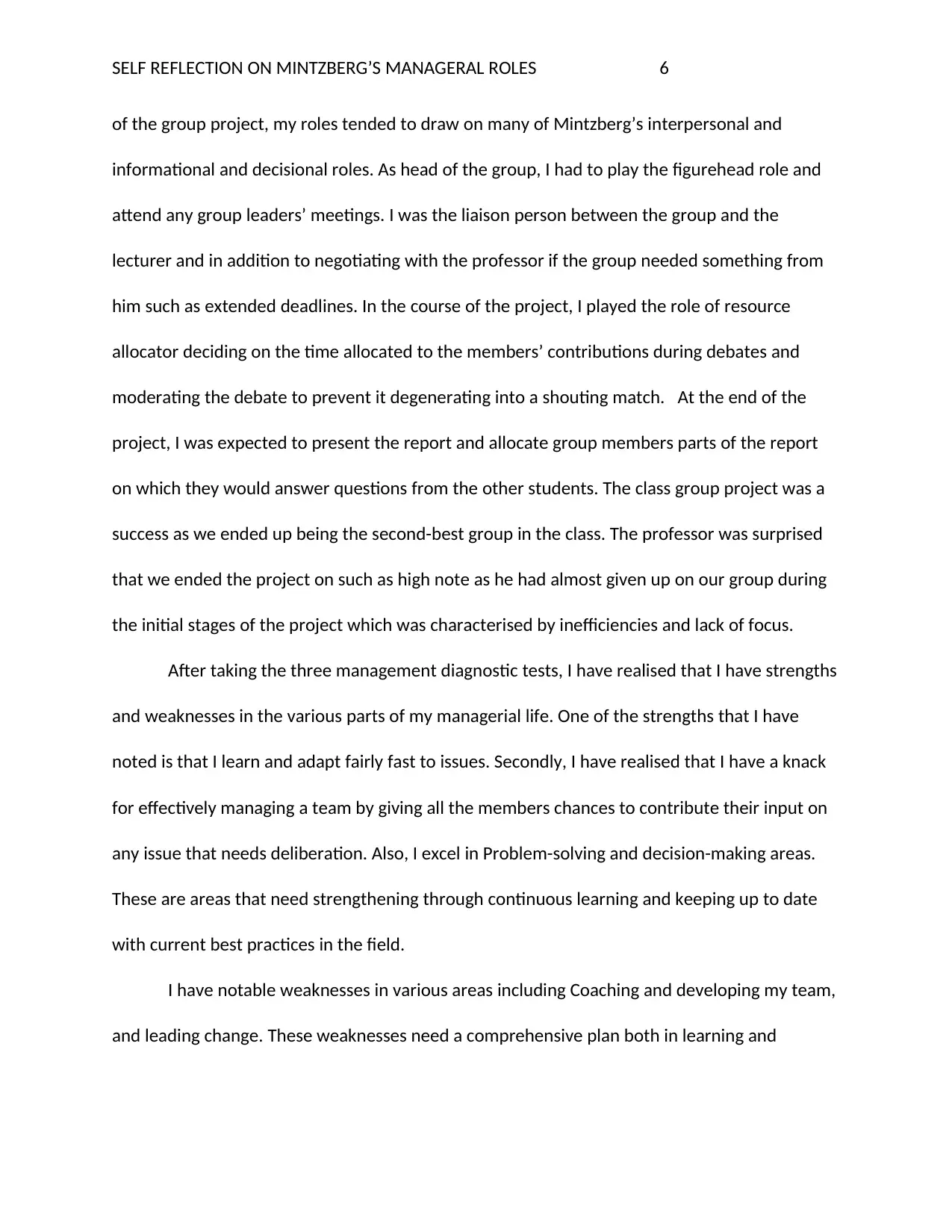
SELF REFLECTION ON MINTZBERG’S MANAGERAL ROLES 6
of the group project, my roles tended to draw on many of Mintzberg’s interpersonal and
informational and decisional roles. As head of the group, I had to play the figurehead role and
attend any group leaders’ meetings. I was the liaison person between the group and the
lecturer and in addition to negotiating with the professor if the group needed something from
him such as extended deadlines. In the course of the project, I played the role of resource
allocator deciding on the time allocated to the members’ contributions during debates and
moderating the debate to prevent it degenerating into a shouting match. At the end of the
project, I was expected to present the report and allocate group members parts of the report
on which they would answer questions from the other students. The class group project was a
success as we ended up being the second-best group in the class. The professor was surprised
that we ended the project on such as high note as he had almost given up on our group during
the initial stages of the project which was characterised by inefficiencies and lack of focus.
After taking the three management diagnostic tests, I have realised that I have strengths
and weaknesses in the various parts of my managerial life. One of the strengths that I have
noted is that I learn and adapt fairly fast to issues. Secondly, I have realised that I have a knack
for effectively managing a team by giving all the members chances to contribute their input on
any issue that needs deliberation. Also, I excel in Problem-solving and decision-making areas.
These are areas that need strengthening through continuous learning and keeping up to date
with current best practices in the field.
I have notable weaknesses in various areas including Coaching and developing my team,
and leading change. These weaknesses need a comprehensive plan both in learning and
of the group project, my roles tended to draw on many of Mintzberg’s interpersonal and
informational and decisional roles. As head of the group, I had to play the figurehead role and
attend any group leaders’ meetings. I was the liaison person between the group and the
lecturer and in addition to negotiating with the professor if the group needed something from
him such as extended deadlines. In the course of the project, I played the role of resource
allocator deciding on the time allocated to the members’ contributions during debates and
moderating the debate to prevent it degenerating into a shouting match. At the end of the
project, I was expected to present the report and allocate group members parts of the report
on which they would answer questions from the other students. The class group project was a
success as we ended up being the second-best group in the class. The professor was surprised
that we ended the project on such as high note as he had almost given up on our group during
the initial stages of the project which was characterised by inefficiencies and lack of focus.
After taking the three management diagnostic tests, I have realised that I have strengths
and weaknesses in the various parts of my managerial life. One of the strengths that I have
noted is that I learn and adapt fairly fast to issues. Secondly, I have realised that I have a knack
for effectively managing a team by giving all the members chances to contribute their input on
any issue that needs deliberation. Also, I excel in Problem-solving and decision-making areas.
These are areas that need strengthening through continuous learning and keeping up to date
with current best practices in the field.
I have notable weaknesses in various areas including Coaching and developing my team,
and leading change. These weaknesses need a comprehensive plan both in learning and
⊘ This is a preview!⊘
Do you want full access?
Subscribe today to unlock all pages.

Trusted by 1+ million students worldwide
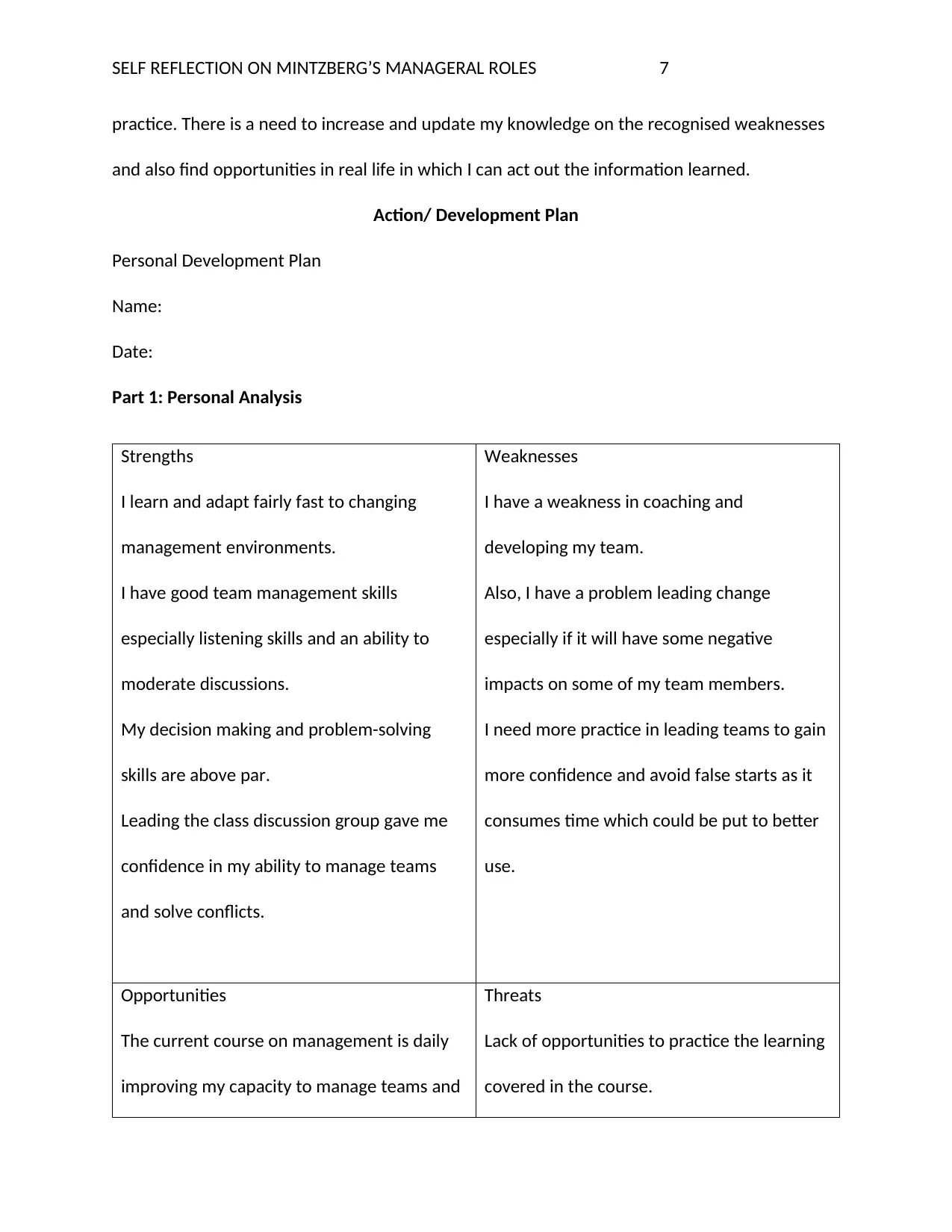
SELF REFLECTION ON MINTZBERG’S MANAGERAL ROLES 7
practice. There is a need to increase and update my knowledge on the recognised weaknesses
and also find opportunities in real life in which I can act out the information learned.
Action/ Development Plan
Personal Development Plan
Name:
Date:
Part 1: Personal Analysis
Strengths
I learn and adapt fairly fast to changing
management environments.
I have good team management skills
especially listening skills and an ability to
moderate discussions.
My decision making and problem-solving
skills are above par.
Leading the class discussion group gave me
confidence in my ability to manage teams
and solve conflicts.
Weaknesses
I have a weakness in coaching and
developing my team.
Also, I have a problem leading change
especially if it will have some negative
impacts on some of my team members.
I need more practice in leading teams to gain
more confidence and avoid false starts as it
consumes time which could be put to better
use.
Opportunities
The current course on management is daily
improving my capacity to manage teams and
Threats
Lack of opportunities to practice the learning
covered in the course.
practice. There is a need to increase and update my knowledge on the recognised weaknesses
and also find opportunities in real life in which I can act out the information learned.
Action/ Development Plan
Personal Development Plan
Name:
Date:
Part 1: Personal Analysis
Strengths
I learn and adapt fairly fast to changing
management environments.
I have good team management skills
especially listening skills and an ability to
moderate discussions.
My decision making and problem-solving
skills are above par.
Leading the class discussion group gave me
confidence in my ability to manage teams
and solve conflicts.
Weaknesses
I have a weakness in coaching and
developing my team.
Also, I have a problem leading change
especially if it will have some negative
impacts on some of my team members.
I need more practice in leading teams to gain
more confidence and avoid false starts as it
consumes time which could be put to better
use.
Opportunities
The current course on management is daily
improving my capacity to manage teams and
Threats
Lack of opportunities to practice the learning
covered in the course.
Paraphrase This Document
Need a fresh take? Get an instant paraphrase of this document with our AI Paraphraser
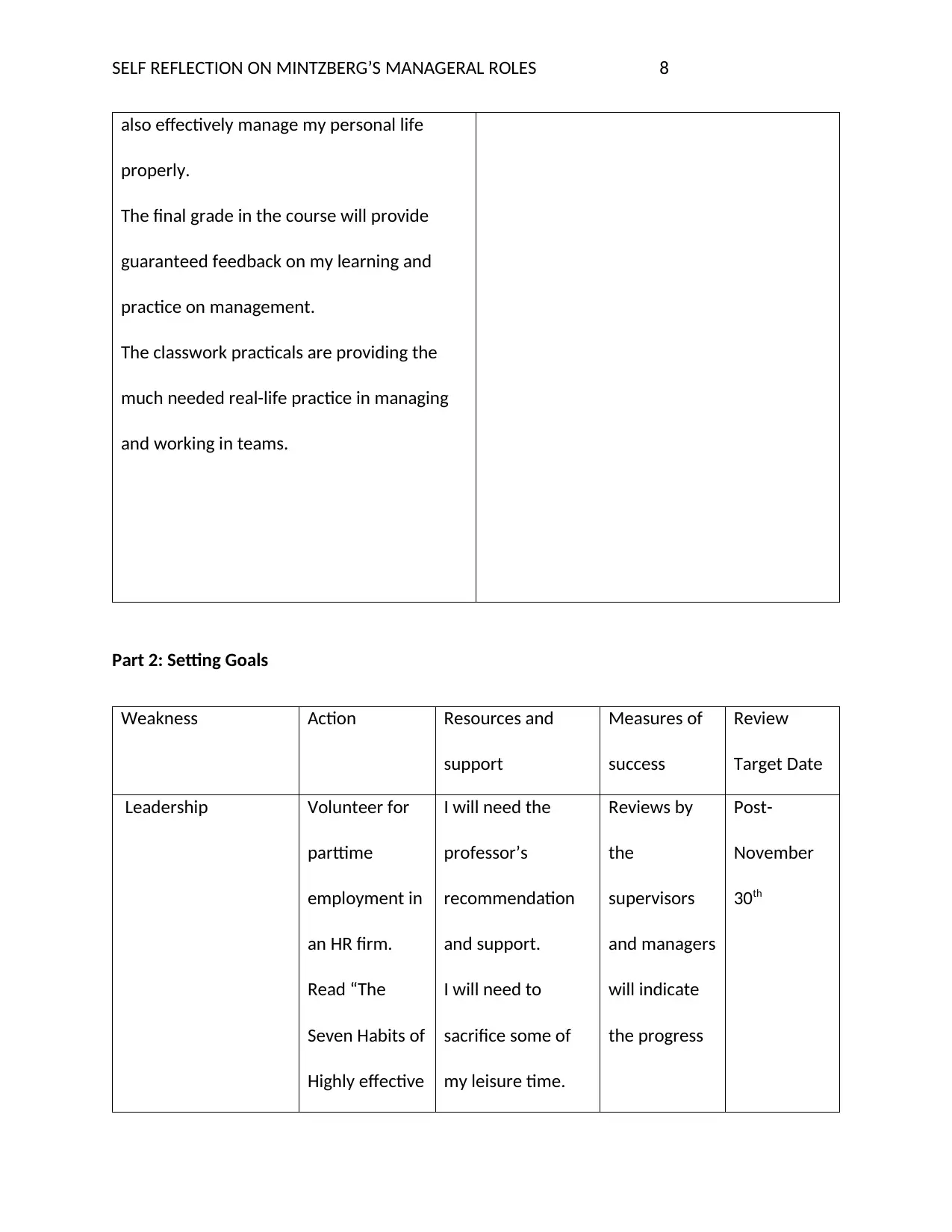
SELF REFLECTION ON MINTZBERG’S MANAGERAL ROLES 8
also effectively manage my personal life
properly.
The final grade in the course will provide
guaranteed feedback on my learning and
practice on management.
The classwork practicals are providing the
much needed real-life practice in managing
and working in teams.
Part 2: Setting Goals
Weakness Action Resources and
support
Measures of
success
Review
Target Date
Leadership Volunteer for
parttime
employment in
an HR firm.
Read “The
Seven Habits of
Highly effective
I will need the
professor’s
recommendation
and support.
I will need to
sacrifice some of
my leisure time.
Reviews by
the
supervisors
and managers
will indicate
the progress
Post-
November
30th
also effectively manage my personal life
properly.
The final grade in the course will provide
guaranteed feedback on my learning and
practice on management.
The classwork practicals are providing the
much needed real-life practice in managing
and working in teams.
Part 2: Setting Goals
Weakness Action Resources and
support
Measures of
success
Review
Target Date
Leadership Volunteer for
parttime
employment in
an HR firm.
Read “The
Seven Habits of
Highly effective
I will need the
professor’s
recommendation
and support.
I will need to
sacrifice some of
my leisure time.
Reviews by
the
supervisors
and managers
will indicate
the progress
Post-
November
30th
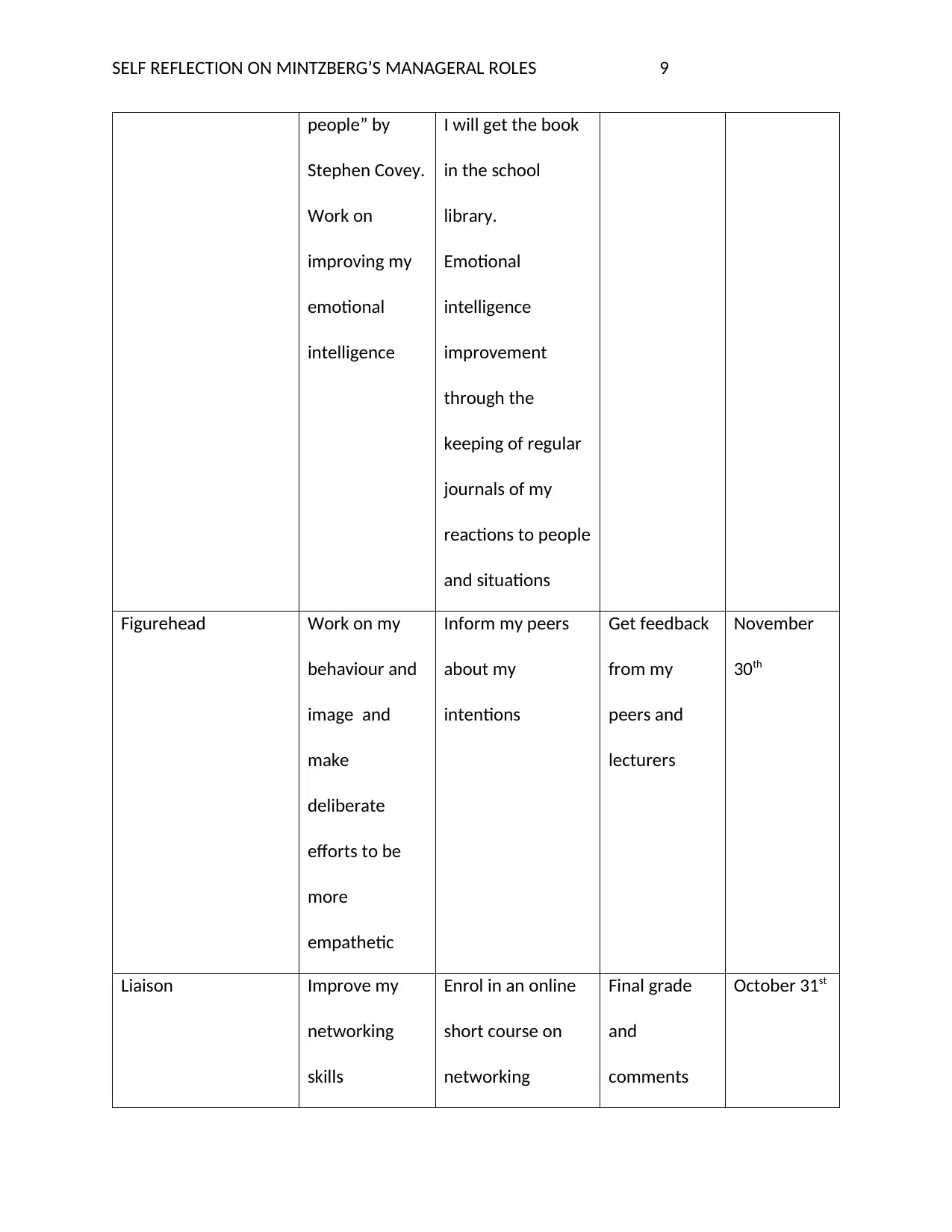
SELF REFLECTION ON MINTZBERG’S MANAGERAL ROLES 9
people” by
Stephen Covey.
Work on
improving my
emotional
intelligence
I will get the book
in the school
library.
Emotional
intelligence
improvement
through the
keeping of regular
journals of my
reactions to people
and situations
Figurehead Work on my
behaviour and
image and
make
deliberate
efforts to be
more
empathetic
Inform my peers
about my
intentions
Get feedback
from my
peers and
lecturers
November
30th
Liaison Improve my
networking
skills
Enrol in an online
short course on
networking
Final grade
and
comments
October 31st
people” by
Stephen Covey.
Work on
improving my
emotional
intelligence
I will get the book
in the school
library.
Emotional
intelligence
improvement
through the
keeping of regular
journals of my
reactions to people
and situations
Figurehead Work on my
behaviour and
image and
make
deliberate
efforts to be
more
empathetic
Inform my peers
about my
intentions
Get feedback
from my
peers and
lecturers
November
30th
Liaison Improve my
networking
skills
Enrol in an online
short course on
networking
Final grade
and
comments
October 31st
⊘ This is a preview!⊘
Do you want full access?
Subscribe today to unlock all pages.

Trusted by 1+ million students worldwide
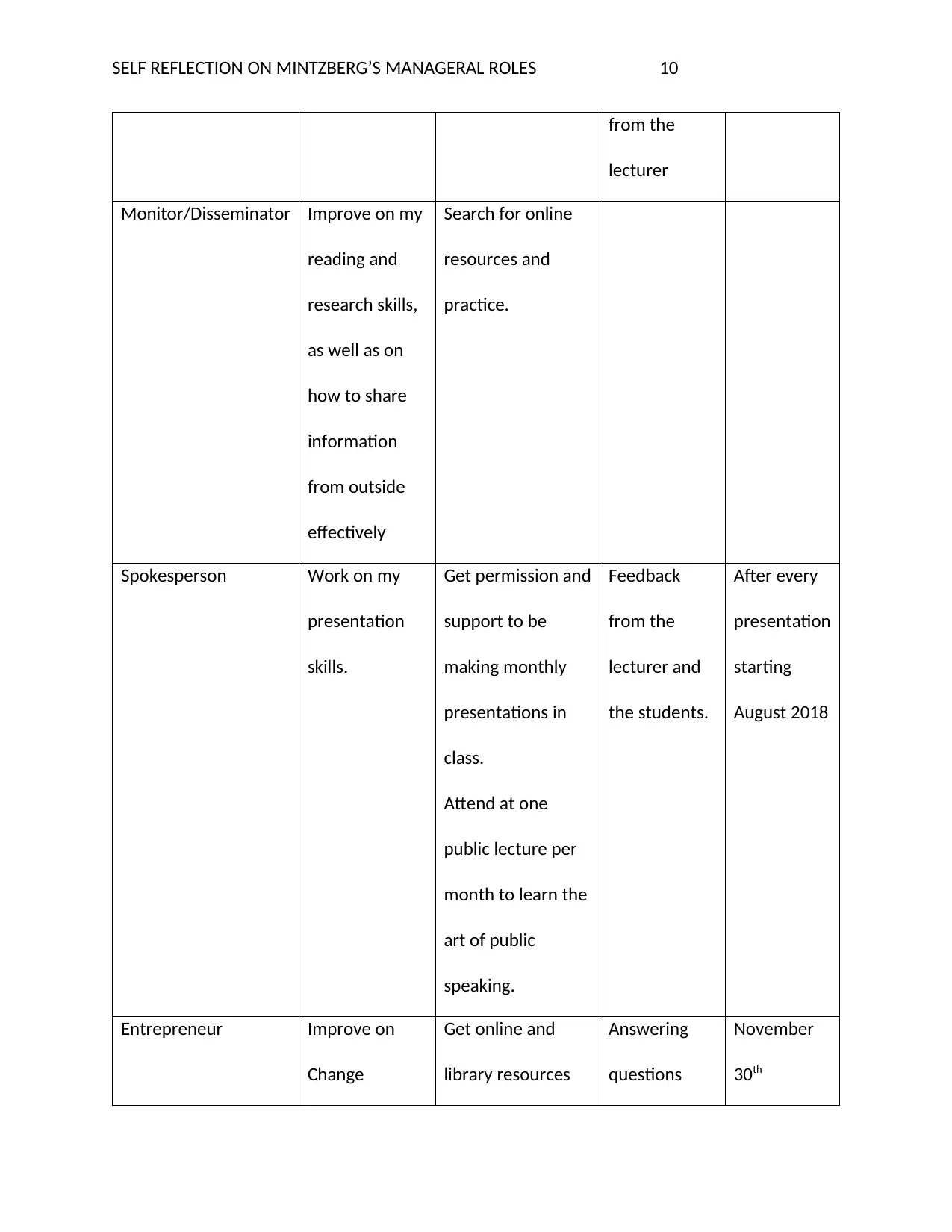
SELF REFLECTION ON MINTZBERG’S MANAGERAL ROLES 10
from the
lecturer
Monitor/Disseminator Improve on my
reading and
research skills,
as well as on
how to share
information
from outside
effectively
Search for online
resources and
practice.
Spokesperson Work on my
presentation
skills.
Get permission and
support to be
making monthly
presentations in
class.
Attend at one
public lecture per
month to learn the
art of public
speaking.
Feedback
from the
lecturer and
the students.
After every
presentation
starting
August 2018
Entrepreneur Improve on
Change
Get online and
library resources
Answering
questions
November
30th
from the
lecturer
Monitor/Disseminator Improve on my
reading and
research skills,
as well as on
how to share
information
from outside
effectively
Search for online
resources and
practice.
Spokesperson Work on my
presentation
skills.
Get permission and
support to be
making monthly
presentations in
class.
Attend at one
public lecture per
month to learn the
art of public
speaking.
Feedback
from the
lecturer and
the students.
After every
presentation
starting
August 2018
Entrepreneur Improve on
Change
Get online and
library resources
Answering
questions
November
30th
Paraphrase This Document
Need a fresh take? Get an instant paraphrase of this document with our AI Paraphraser
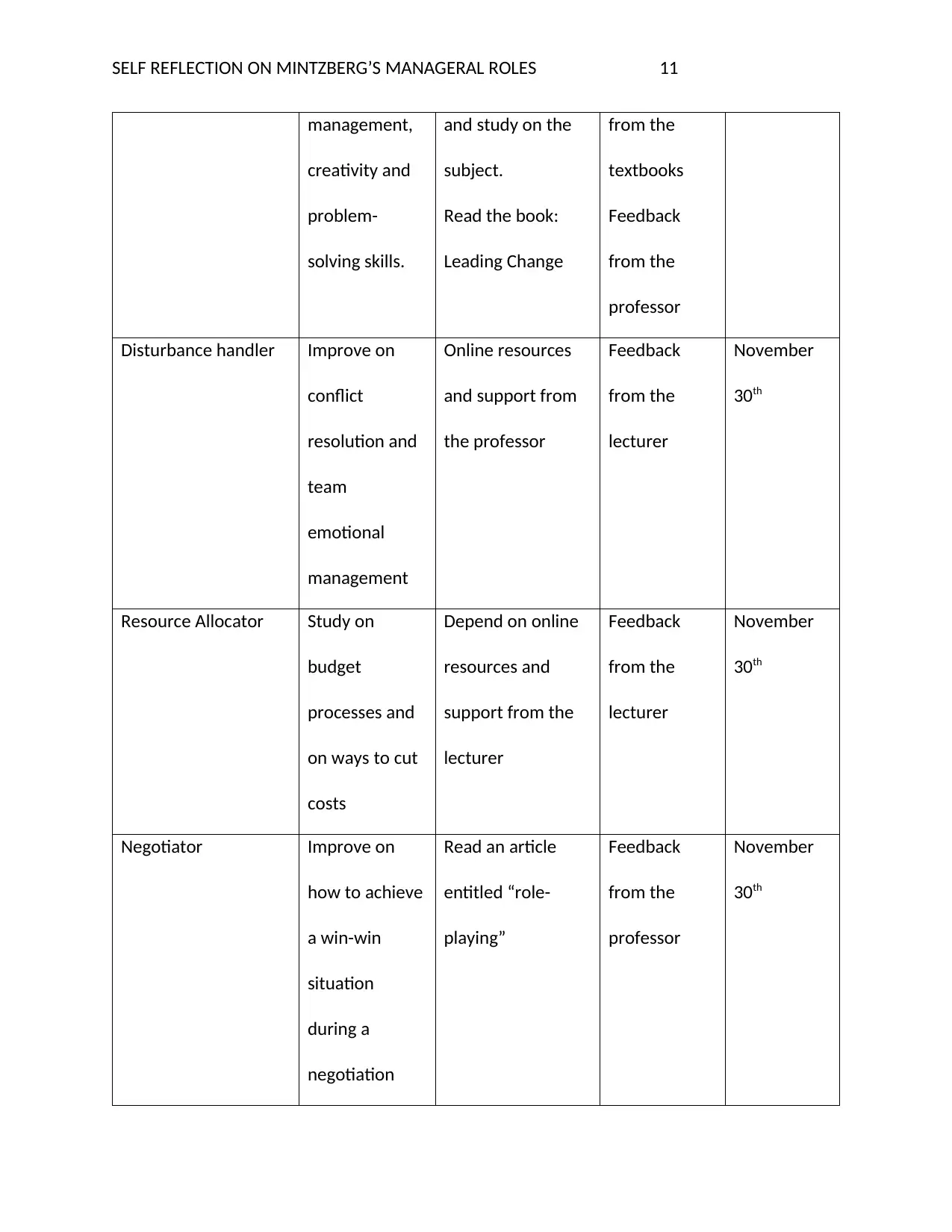
SELF REFLECTION ON MINTZBERG’S MANAGERAL ROLES 11
management,
creativity and
problem-
solving skills.
and study on the
subject.
Read the book:
Leading Change
from the
textbooks
Feedback
from the
professor
Disturbance handler Improve on
conflict
resolution and
team
emotional
management
Online resources
and support from
the professor
Feedback
from the
lecturer
November
30th
Resource Allocator Study on
budget
processes and
on ways to cut
costs
Depend on online
resources and
support from the
lecturer
Feedback
from the
lecturer
November
30th
Negotiator Improve on
how to achieve
a win-win
situation
during a
negotiation
Read an article
entitled “role-
playing”
Feedback
from the
professor
November
30th
management,
creativity and
problem-
solving skills.
and study on the
subject.
Read the book:
Leading Change
from the
textbooks
Feedback
from the
professor
Disturbance handler Improve on
conflict
resolution and
team
emotional
management
Online resources
and support from
the professor
Feedback
from the
lecturer
November
30th
Resource Allocator Study on
budget
processes and
on ways to cut
costs
Depend on online
resources and
support from the
lecturer
Feedback
from the
lecturer
November
30th
Negotiator Improve on
how to achieve
a win-win
situation
during a
negotiation
Read an article
entitled “role-
playing”
Feedback
from the
professor
November
30th
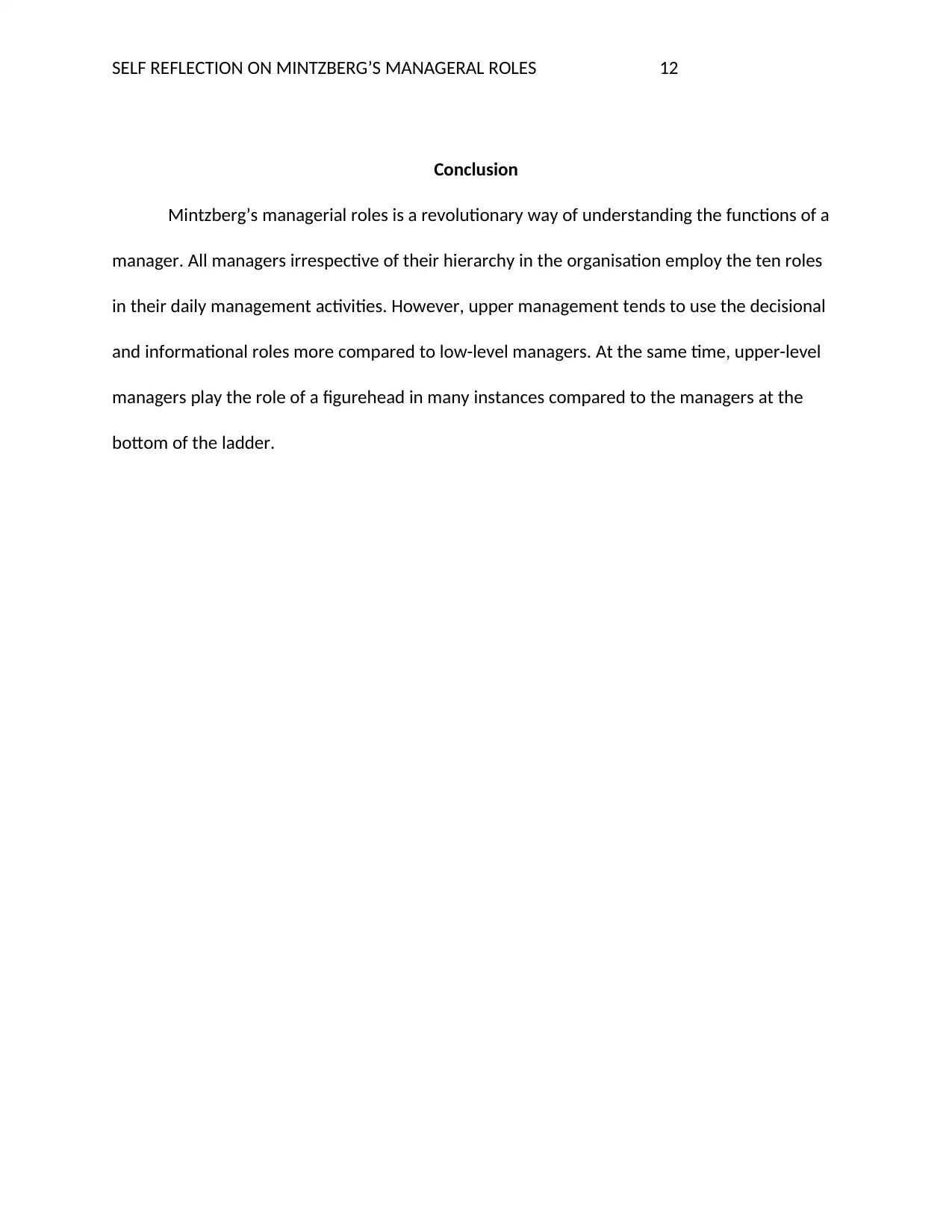
SELF REFLECTION ON MINTZBERG’S MANAGERAL ROLES 12
Conclusion
Mintzberg’s managerial roles is a revolutionary way of understanding the functions of a
manager. All managers irrespective of their hierarchy in the organisation employ the ten roles
in their daily management activities. However, upper management tends to use the decisional
and informational roles more compared to low-level managers. At the same time, upper-level
managers play the role of a figurehead in many instances compared to the managers at the
bottom of the ladder.
Conclusion
Mintzberg’s managerial roles is a revolutionary way of understanding the functions of a
manager. All managers irrespective of their hierarchy in the organisation employ the ten roles
in their daily management activities. However, upper management tends to use the decisional
and informational roles more compared to low-level managers. At the same time, upper-level
managers play the role of a figurehead in many instances compared to the managers at the
bottom of the ladder.
⊘ This is a preview!⊘
Do you want full access?
Subscribe today to unlock all pages.

Trusted by 1+ million students worldwide
1 out of 32
Related Documents
Your All-in-One AI-Powered Toolkit for Academic Success.
+13062052269
info@desklib.com
Available 24*7 on WhatsApp / Email
![[object Object]](/_next/static/media/star-bottom.7253800d.svg)
Unlock your academic potential
Copyright © 2020–2026 A2Z Services. All Rights Reserved. Developed and managed by ZUCOL.




